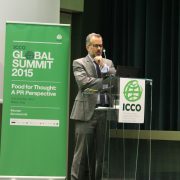What’s Keeping PR Agency Bosses Awake At Night? #agencypublisher
Written by: David Gallagher
Last week’s annual summit of the International Communications Consultancy Organization (ICCO) drew PR agency heads from nearly 40 countries to discuss the opportunities and challenges in front of the industry.
This meeting is particularly known for its candour; the fact there are no clients in attendance reduces the showboating we’re famously fond of, and the speakers (from independents and the big networks alike) are especially generous and open with their insights.
The good news: PR consulting continues to grow worldwide. This is partly from new markets joining the global pool. Partly from new clients adding PR for the first time to their wider business consulting and marketing communications investment. Partly from agencies adding new services to their proposition, particularly in digital and social media. And partly, I think, from clients shifting a (small) share of their large ad budgets to PR.
The bad news: well, there’s not much bad news, but there are a number of challenges keeping agency chiefs from feeling complacent. Specifics vary by market, but the main anxieties follow common themes.
Here’s a quick look:
- Talent: How do we attract talent from ‘non-traditional’ backgrounds to manage the new services and technologies our evolvling propositions require? How do we keep, develop and inspire our established talent – especially ‘millennials’? And how do we leverage our senior talent in a fast-changing market?
- Business models: How do we move from hourly rates and retainers to value-based service propositions (payment for business results)? How do we structure teams to include more flexible solutions? How can we integrate with ad agencies and other consultancies to meet complex client problems, without giving the farm away?
- Competition: How do we manage in an environment in which we compete with each other on some engagements, while working as partners on others? Are ad agencies our friends (for leads), competitors (for budget) or somewhere in between – frenemies? Are digital and social media agencies potential poachers? Or acquisition candidates? And how many unseen / disruptive competitors are there beyond our line of sight, waiting to Uberize our industry with wholly new approaches? Does “PR” have value with the client community as a description of our proposition? Or is it need of modernization?
- Creativity: Are we sufficiently creative compared to other disciplines and channels? Is it something we can teach, or is it found in talent to hire? Are awards good indications you have it? How do you measure it?
Obviously a lot of the discussion revolved around what’s changing in our business, and how to address these developments in ways that make sense for our people, clients and shareholders. Some of it focused on where – with a strong delegation from Africa discussing the remarkable growth and opportunity for PR consultancy there.
But maybe it was the theme of why PR advice is now more needed than ever that offered participants the greatest comfort. Knowing that you play a role in connecting people – helping them understand each other and the world around them – can be a strong incentive to work through the operational challenges.
I’ll share some of the solutions and experiments presented in future posts, but for now, it’s good to know that as diverse as our industry is, we’re all worried about similar things.
See you in Istanbul for the ICCO Global Summit 2016!






